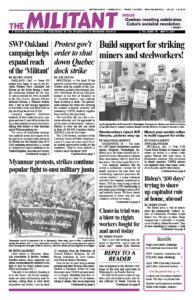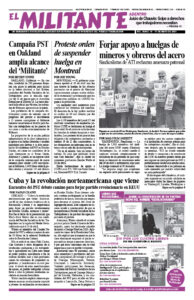MONTREAL — On April 30 the minority Liberal Party government in Ottawa, with the support of the Conservatives, pushed a law through Canada’s Parliament declaring longshore workers at the Port of Montreal to be “essential workers” and ordering them to return to work. The government claimed the strike was harming the national economic recovery and preventing COVID medical supplies from reaching the population.
The anti-labor bill says that a mediator-arbitrator will be appointed to set the terms of the workers’ contract. Refusal to obey the law can result in fines of 100,000 Canadian dollars ($80,000) a day for the union.
The 1,150 workers, members of the Canadian Union of Public Employees Local 375, went on strike April 26 after several provocative actions by the employers. They’ve been without a contract since December 2018.
At the center of the workers’ fight is unsafe and intolerable work schedules. The Maritime Employers Association had unilaterally forced dockworkers to work 19 days out of 21. And they only get a one-day notice of what shift they will be on.
“It’s not the wages. It is the hours of work. It’s so we can have a family life,” port truck driver Émilie Wolfe told this Militant worker-correspondent as she was going into work April 20.
The strike had received widespread labor support, including from both the International Longshoremen’s Association and the International Longshore and Warehouse Union, which organizes dockworkers in Vancouver on the West Coast.
On March 21 the workers rejected the latest offer from the bosses by 99.7%.
Canadian Prime Minister Justin Trudeau “just sent a loud and clear message to every employer in the country,” CUPE National President Mark Hancock told the press after the strikebreaking law was adopted. “Don’t bother bargaining in good faith with your workers, because if things get tough, we’ll be there to back you up.”
As it became clear the government would pass the law, Maritime Employers Association representatives walked out of negotiations with the union the day after the strike began.
Union spokesperson Michel Murray told hundreds of longshore workers at a rally April 29 that CUPE would challenge the law in court and filed a formal complaint before the International Labor Organization charging that workers’ right to strike had been violated. Workers returned to their jobs May 1.
In a statement issued after the law was passed, Beverly Bernardo, Communist League candidate for mayor of Montreal, denounced Ottawa’s attack on the right to strike. “Our right to withdraw our labor is essential to fighting for better wages and working conditions,” she said. “Our power lies in our numbers and the fact that it is our labor that produces all wealth.
“The whole labor movement needs to oppose this attack on workers’ rights by mobilizing support for the fight of the longshore workers.”
Statements of support can be sent to CUPE Local 375, 7020 rue Notre-Dame est, Montreal, QC, H1N 3L6, Canada.

